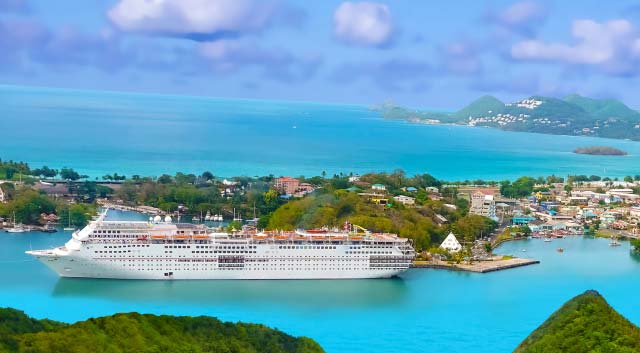Why Medical Coverage Is Essential on a Cruise Vacation
Cruise vacations offer relaxation and adventure, but unexpected illness or injury can turn your trip upside down. Learn why it’s critical to have coverage for medical emergencies, what it costs to get care or evacuated, and how standard health insurance and Medicare often fall short.
Cruise vacations are often seen as the ultimate escape -- floating resorts offering gourmet dining, exotic destinations, and endless entertainment. But while you're soaking up the sun or exploring a new port, you’re still vulnerable to illness and injury. In fact, cruise ships are uniquely susceptible to certain health risks due to their enclosed environments, international itineraries, and limited onboard medical resources.
That’s why having travel protection with Medical and Dental coverage is not just a smart idea, it’s essential.
The Hidden Health Risks of Cruise Travel
Cruise ships are basically small cities at sea, and like any densely populated environment, they can be breeding grounds for illness. Norovirus, a highly contagious gastrointestinal virus, is one of the most common culprits. According to the CDC, cruise ships reported 15 norovirus outbreaks in 2024.
Other common ailments include respiratory infections, foodborne illnesses, seasickness, and injuries from excursions or onboard activities.
Even with strict sanitation protocols, the close quarters and shared facilities make it easy for viruses to spread. Add in the fact that passengers are often older adults or individuals with pre-existing conditions, and the risk of serious medical issues increases significantly.
What Happens If You Get Sick on a Cruise?
Every cruise ship is equipped with a medical center staffed by licensed doctors and nurses. These facilities are designed to handle minor injuries and illnesses, such as dehydration, cuts, sprains, or flu-like symptoms. They also have the equipment to stabilize more serious conditions until the passenger can be transferred to a hospital on land.
However, medical care on a cruise ship is not free and it’s not cheap. A basic consultation during regular hours can cost around $100, while after-hours visits or overnight observations may run much more.
Additional services like X-rays, lab tests, IV fluids, and medications are billed separately and can quickly add up. According to the CDC and Department of State, most cruise lines do not accept U.S. health insurance or Medicare, meaning passengers must pay out of pocket and seek reimbursement later.
Tip: If you have pre-existing medical conditions that might require treatment, ask the cruise line what types of medical services the ship can provide and be sure they cover your needs.

The High Cost of Medical Evacuation
If your condition is too serious to be treated onboard, you may need to be evacuated to the nearest hospital. This could involve a boat transfer, ambulance ride, or even a helicopter evacuation. According to Travel With The Greens, the cost of a medical evacuation from a cruise ship can range from $10,000 to $50,000 depending on your location and the complexity of the transport.
These costs are rarely covered by standard health insurance or Medicare. Without travel protection that includes coverage for emergency medical transportation, you could be left with a massive bill.
Also Read: Traveling with Dietary Restrictions: Your Guide to Safe Eating
What Medicare and Standard Health Insurance Don’t Cover
Many travelers assume their domestic health insurance or Medicare will protect them abroad. Unfortunately, that’s not usually the case. Standard Medicare typically does not cover medical care outside the U.S., including care received on a cruise ship more than six hours from a U.S. port.
Private health insurance plans vary widely, but most do not cover international travel or emergency evacuations. Even if your plan offers some out-of-network coverage, you’ll likely need to pay upfront and file a claim later. That’s assuming the provider is willing to work with a foreign or maritime medical facility.

Why Travel Medical Coverage Is a Must for Cruise Travelers
Travel protection with medical coverage fills the gaps left by traditional health insurance and Medicare. A reliable plan from a provider that’s been around for a long time, like Generali Global Assistance, includes:
- Medical and Dental coverage for illness or injury during your trip
- 24/7 access to Telemedicine Services with U.S.-licensed doctors
- Emergency Assistance and Transportation coverage
- Trip Interruption and Cancellation benefits
- Coverage for Pre-Existing conditions (if purchased within a specified time frame with our Premium Plan)
These benefits provide peace of mind knowing that help is just a phone call away.
Real Reviews from Real Travelers
What to Look for in a Cruise Travel Protection Plan
Not all travel protection is created equal. When shopping for a plan, make sure it includes:
- At least $250,000 in Emergency Evacuation Coverage per person (on our Premium Plan)
- Coverage for COVID-19 and other infectious diseases
- Access to 24/7 Emergency Assistance and Telemedicine
- Coverage for trip delays, cancellations, and missed connections
- A Pre-Existing condition coverage plan (Only available with our Premium Plan)
Plans available from Generali Global Assistance are made with cruise travelers in mind and meet all of these criteria.
Tips for Staying Healthy on a Cruise
While protection is essential, prevention is still the best medicine. Here are a few tips to reduce your risk of getting sick on a cruise:
- Wash your hands frequently with soap and water
- Use hand sanitizer stations throughout the ship
- Stay hydrated and avoid overindulging in food or alcohol
- Get plenty of rest and avoid crowded areas if you feel unwell
- Pack a small medical kit with over-the-counter remedies
If you do start to feel sick, don’t wait. Visit the ship’s medical center early to prevent complications and reduce the risk of spreading illness to others. For other issues, you might benefit from the Telemedicine Services available with our plans.
Cruise vacations are meant to be relaxing and rejuvenating, but they also come with unique health risks. From norovirus outbreaks to unexpected injuries, the potential for medical emergencies is real. And when you’re miles from the nearest hospital, the cost of care and evacuation can be staggering.
That’s why Medical and Dental coverage is not just a nice-to-have, it’s a necessity. Travel protection from a trusted provider like Generali Global Assistance provides peace of mind that you have coverage from the financial and logistical challenges of getting sick at sea. With numerous benefits, 24/7 support, and real-world reliability, it’s one of the smartest investments you can make before setting sail.
Travel Resources
See All8260992508


